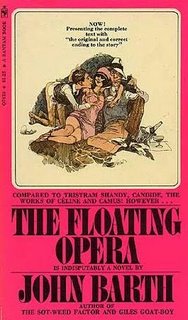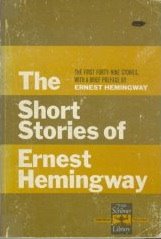
John Barth says his novels come in pairs, and in keeping with his spirit, I'm rereading his first two novels as a pair. Out loud. It's very insightful listening to the words of someone you so admire, as I do John Barth, because you see the genius of his words and at the same time get that sinking feeling that no matter how hard you try you'll never be as good as that. Plus, several times, it was quite a challenge not to get tongue tied.
The Floating Opera, then, whose counterpart, according to its author, will be the soon featured The End of the Road (the two are sold as a pair under the same cover), is a raucous adventure through a day in the life of one very interesting anti-hero named Todd Andrews. That's right: one day. Barth is obviously attempting a literary tradition trying to pull a novel out of one day, the likes of which Joyce has done in momentous form with Ulysses as well as countless others. The upside is it's fantastic fun. Andrews is witty and clever, he's shifty and reasonable, he's the guy every guy wishes he could be without really ever wishing they could be him. Todd Andrews is a lawyer, he's been a saint and a cynic previously, and on the day in question, he's planning to kill himself.
So suicide in all its controversy (more so I'm sure in 1957) is highlighted gloriously, arguments made for its necessity and rebutted for its inherent paradox (if life has no value, and suicide is thus useful, then death has no value, and suicide is thus useless). Along the way we meet a cast of interesting characters, including the beautiful Jane Mack, wife of best friend Harrison Mack, who Todd has an affair with with both Harrison's knowledge and consent, their daughter Jeannine (who may or may not be Todd's), the Dorchester County Explorer's Club, and many, many more. It touches on everything from war to the law to relationships, and yet, like its narrator, commits to nothing. It's a full boat, The Floating Opera, but it will never sink.
The cover's great, and while it's about the author's beloved Maryland Tidewater area, which he writes magnificently about, it makes me really want to visit the south.


